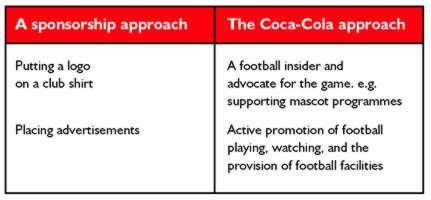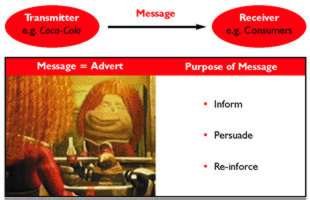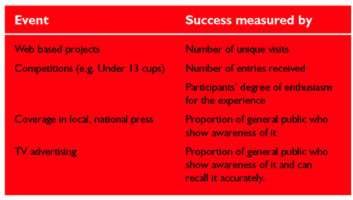Football is the ‘world game’ and Coca-Cola is the brand name of the world’s biggest selling soft drink, so it is hardly surprising that the two have become closely linked. Coca-Cola has a long history of supporting and working with people and organisations seeking to develop football at all levels. From this lengthy relationship, the Company has a deep understanding of the game and of the excitement of football fans.
One of The Coca-Cola Company’s core values is to ‘support and strengthen our communities’ and Coca-Cola has taken a unique and innovative approach to local communities through the development of its football-related programmes. Not only have these been specifically developed to deliver on corporate and brand reputation, but also to develop its citizenship programmes through activation at the grass-roots level and tackling important social issues.
Creating strong relationships is at the heart of any successful business. By sharing values, building trust and providing mutual benefit to a wide range of consumers, customers, and other ‘stakeholders’ Coca-Cola aims to fulfil its promise – to benefit and refresh everyone who is touched by its business.
We live in a world of diverse cultures and interests and by focusing on the interests of local consumers – such as football – Coca-Cola strives to build closer relationships with consumers. Coca-Cola has a long-standing commitment to encouraging young people to participate in team sports and live healthy and active lifestyles. Strong grass-roots programmes that introduce young people to football in a supportive environment are also the best way to build and sustain football at the international level.

Because of its central position in the lives of many GB citizens, football plays a key role in Coca-Cola GB’s marketing activities. The Company’s focus is on the football fan rather than football itself and Coca-Cola sees itself not as an external sponsor of football but as a ‘football insider’. This involves actively promoting the playing and watching of football and the provision of facilities for both of these activities, rather than simply helping to fund professional clubs (e.g. by buying advertising space at their grounds). The aim is to keep all promotional activity credible and authentic.

Within football, Coca-Cola operates at four main levels:
- International: World Cup, European Championship
- High Level Domestic: Premiership in England and Premier League in Scotland
- Local Clubs/Community: Sweeper Zone Programme, local relationships with clubs
- Grassroots: the Schools Football Associations in England and Scotland, local full-time/part-time professional football teams.
Coca-Cola initiatives aim to:
- demonstrate the brand’s passion for football and football fans
- demonstrate Coca-Cola as an ‘insider’ rather than merely a sponsor of football
- be genuinely innovative and distinctive in what is a crowded market
- create credible and authentic marketing
- build on the long-standing relationship between Coca-Cola and football.
Communication

Communication is the process of putting messages across to a targeted audience. For effective communication to take place, the sender of the message must:
- be clear about the intended message
- use an appropriate medium for that particular message e.g. mail, TV advert, Internet, public address system
- present the message clearly and unambiguously.
The intended recipient(s) must be:
- able to receive the message
- ready and willing to listen to it
- open to persuasion with regard to it.
These rules are crucial to successful communication.

People sending messages do not all have the same objective. They may want to:
- inform e.g. ‘Contains at least 33 per cent extra free’
- persuade e.g. ‘This offer can never be repeated’
- reinforce a message or consumer pattern e.g. “Customers are reminded that….”
Coca-Cola and its levels of football communication
Coca-Cola addresses audiences at four different levels.
Grassroots – Young people want opportunities to play football in a safe, organised, and fun environment. Recognising this, Coca-Cola is involved with the English and Scottish Schools Football Association tournaments. For example over 2,000 schools from across England enter the under 13’s, 11 a side tournament involving approximately 30,000 young, keen footballers. These teams cover 44 counties and are split into 4 geographical regions, North, Midlands, South East and South West. The winners of the 4 regional finals are invited to play for the pride of England in the Coca-Cola Schools Cup Final at Anfield Stadium, the home of Liverpool F.C.
Local professional football clubs know that their future depends on attracting more families to games. That means persuading Mum and the kids to come along too. Coca-Cola supports good practice in the use of mascots, whereby children enter competitions that allow them to be their club mascot. Details of the competition vary from club to club.

Local Clubs/Community – e.g. Sweeper Zone: a community programme in partnership with environmental group Encams, and supported by local people and businesses, which harnesses the cultural appeal of football, the passion and loyalty of fans, and youth appeal of Coca-Cola to improve the environment around Premiership football grounds.
High Level Domestic: Premiership in England and Premier League in Scotland – A major element of the football sponsorship of Coca-Cola is the TV sponsorship of ITV’s weekly football programme The Premiership, which is shown in both England and Scotland and is a ‘must’ for most followers of the professional game. This offers Coca-Cola the opportunity to engage with a large number of football fans on a weekly basis and supports its objective of providing these fans with access to football. The sponsorship takes the form of idents or ‘bumper breaks’ at the start of the programme, and, before and after the advertising breaks. In addition, Coca-Cola sponsors the ITV Football website – https://www.itv-football.co.uk/
International: World Cup and European Championship – Coca-Cola engaged in a variety of activities for the FIFA World Cup 2002, all of which were designed to bring fans closer both to each other and to the event. Key activities included:
- A unique competition to design a Coca-Cola perimeter advertising board for display at all England games during the tournament. A boy aged 7 won. He and his family were flown to the tournament in Japan to watch the England vs Sweden game and see his board in use.
- The FIFA World Cup “Trophy Trip”, is run in conjunction with Sainsbury’s. This offered a large number of fans the chance to participate in a celebration event where they had their photographs taken with the FIFA World Cup Trophy.
Barriers to effective communication

Corporate support for football and interest in football sponsorship takes place in a crowded marketplace, with many different brands competing for attention, so it would be all too easy for messages to become blurred and confused.
‘Noise’ describes any obstacle to the smooth transmission of a communications message. Coca-Cola works hard to limit these obstacles and barriers, but not everything is within its immediate control e.g. cameras at a football match failing to focus on advertising hoardings, an announcer stumbling over the name of the provider of the match ball.
Some types of ‘noise’ can be anticipated and steps are taken to avoid them. For example, there is no point in ‘having your name up in lights’ in a city, however large, where the electricity supply is unreliable.
Some notable communication successes
Coca-Cola has made its messages effective by following carefully the rules of good communication and also the maxims:
- ‘Know your audience, and how best to address it.’
- ‘Know your market: what makes it tick, and what turns it off.’
As a knowledgeable ‘insider’, the Company is well educated in the different worlds within the one game. Thus, its activities and approaches with, say, the Schools Football Association are very different from those the Company deploys when working with FIFA. The difference lies not in the degree of importance that the Company attaches to the work and to ‘getting it right’ but in the kind of support it offers and how it offers it.
The 2002 FIFA World Cup demonstrated the ability of Coca-Cola to get its message across to billions of TV viewers worldwide. Not only that, the Company used its understanding of the game to ‘get closer to the fans’.
Prior to the World Cup, Coca-Cola encouraged participation from across the globe in its Stadium Art Programme, where fans from all five continents competed to create unique Coca-Cola advertising that was showcased in stadiums in Korea and Japan. The winning designs from each nation were featured in pitch-side advertising.

The Sweeper Zone programme is designed to help local communities take pride in the local environment surrounding their football clubs. The programme involves an active partnership between Coca-Cola, Encams, football clubs, local councils, businesses and the local community with the aim of creating a cleaner environment. Coca-Cola used its marketing expertise to help create the Sweeper Zone identity and branding.
The Sweeper Zone is effectively an area surrounding a football ground and is marked out by clear signage. It is particularly active on match days when clubs communicate to fans through messages on the public address system and in match day programmes. The youth appeal of Coca-Cola has also helped to motivate young people in the local community through the Sweeper Zone Young Ambassadors programme, which supports their personal development and educates them on environmental issues. The young people are particularly active on match days when they remind fans to keep the area clean.
Sweeper Zone is also a great example of the innovative approach that Coca-Cola has taken to the development of football related programmes which also delivers on a number of the Company’s citizenship and corporate responsibility commitments such as community and the environment.
The programme not only harnesses the power of the brand and the universal appeal of football to educate the community at large about environmental concerns surrounding football grounds, but it also supports them in changing their behaviour to dispose of litter in a more responsible way. The trial scheme operated in zones around the grounds of Arsenal and Liverpool FC.
Evaluating effective communication

The Company uses several means of evaluating the success of its communications programs including:
- audience response to local initiatives e.g. pupils involved in local football coaching and football competitions – how positive have they been about their experience?
- reach – how many people have been involved in football initiatives supported by Coca-Cola?
- opportunities to see and absorb – how many people have been exposed to messages about Coca-Cola and its support for football?
- cost per thousand – how effective has the communications exercise been in terms of numbers reached for every £ spent on supporting that particular football initiative? Do those involved in the scheme and who have benefited from it (e.g. youth football associations) feel that it has been ‘money well spent’, or are they suggesting better ways of doing things?

All projects are carefully evaluated to make sure that they are achieving their aims in the most effective manner. Methods of evaluation vary depending on the type of project. Coca-Cola adjusts its activities in light of these evaluations.
Conclusion

For organisations looking to build relationships with customers, and to offer financial and material support to sports to which they are committed, it is not enough to be ‘well meaning’. It is also important to be well informed and professional in approach. There are guidelines to be followed, rules to be observed, disciplines to be maintained.
Coca-Cola has developed a good understanding of this, as its successful support of football clearly testifies. By broadening its football strategy across the communications mix i.e. from International through to grass-roots and the community, Coca-Cola has strengthened its position as a football insider and this helps to build the brand and corporate reputation of Coca-Cola.
“Coca-Cola”, “Coke”, the Dynamic Ribbon device and the design of the “Coca-Cola” Contour Bottle are registered trademarks of The Coca-Cola Company.
